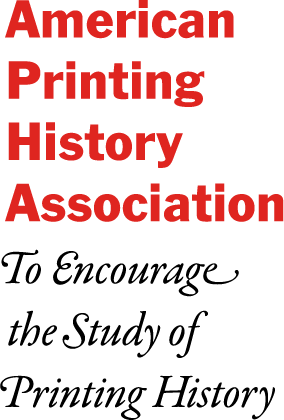Call for Papers
APHA invites submissions for paper and panel proposals for its annual conference, “Enduring Impressions: Private Presses and Their Legacies,” to be held in person at San Francisco State University from October 23–25, 2025.
The conference program will feature curated in-person and live-streamed talks, paper and panel presentations (both in-person and virtual), and tours and events at local institutions, including the Book Club of California, Arion Press, The CODEX Foundation, the Letterform Archive, the San Francisco Center for the Book, and the Marjorie G. and Carl W. Stern Book Arts & Special Collections Center at San Francisco Public Library.
This conference seeks to examine how the legacies of private press printers – their aesthetic choices, technical innovations, collaborative spirit, and philosophical approaches to the book—continue to inform and inspire current printing practices and the book arts. We also encourage explorations of how the historical study of private presses shapes our understanding of printing history itself, revealing alternative narratives and highlighting the contributions of individuals and small presses. Potential paper and panel topics include:
- California printers and their legacies, including evaluations of the impact of John Henry Nash, Edwin and Robert Grabhorn, Jane Grabhorn, Jack Stauffacher, Bill Everson, Bruce McCallister, Ward Ritchie, Saul and Lilian Marks, and their students and successors.
- Private presses beyond California and the West, their unique contributions and their connections to broader trends in printing history and the book arts.
- Previously understudied private presses, and marginalized printers and practitioners working outside the mainstream.
- Private presses as innovators in their use of new printing techniques and technologies, their aesthetic and design choices, and their business models.
- How contemporary artists, printers and practitioners are actively engaging with and reinterpreting the aesthetics, techniques, and philosophies of historical private presses.
- Collecting and preserving the legacy of private presses—their productions, equipment, and records—in libraries, archives, and private collections.
- Private presses and the book arts curriculum, including examinations of how their history and practices are taught and integrated into contemporary book arts education.
This conference welcomes proposals from everyone with a passion for printing and book history, including seasoned scholars, librarians and archivists, printers and book artists, conservators, students, and hobbyists. Submissions are encouraged from people of all backgrounds, including established academics, early career professionals, and independent scholars. We believe that diverse perspectives enrich the conversation, so please do not hesitate to submit your work regardless of institutional affiliation or academic status.
Our hybrid conference format offers maximum participation and accessibility. We encourage you to join us in person in San Francisco for enriching engagement with fellow enthusiasts of printing and book history. Alternatively, presenters unable to travel will have the opportunity to share their research virtually.
Proposals are due by Friday, June 27, 2025 Sunday, July 6, 2025. Proposals will be evaluated based on their originality, clarity, relevance to the conference theme, and potential to stimulate discussion. APHA members whose proposals are accepted will receive complimentary registration to the conference; presenters who are not APHA members will be asked to register at the non-member rate of $85 (regular) or $45 (student).
Proposal and Submission Guidelines
We are soliciting proposals for 20-minute individual presentations or 50-minute group panels of three or four speakers. You will receive a timely acknowledgment that your proposal has been received. Only electronic submissions will be accepted. Please send e-mail proposals as attachments in Microsoft Word or PDF format to: proposals@printinghistory.org.
All proposals must include the following: name(s) of presenter(s) (if proposing a group panel, include names of all group participants); whether you prefer to present in person or virtually; contact information (mailing address, phone number, and e-mail address); short biography (100 words maximum for each participant); title of presentation or panel; and abstract (500 words maximum).

